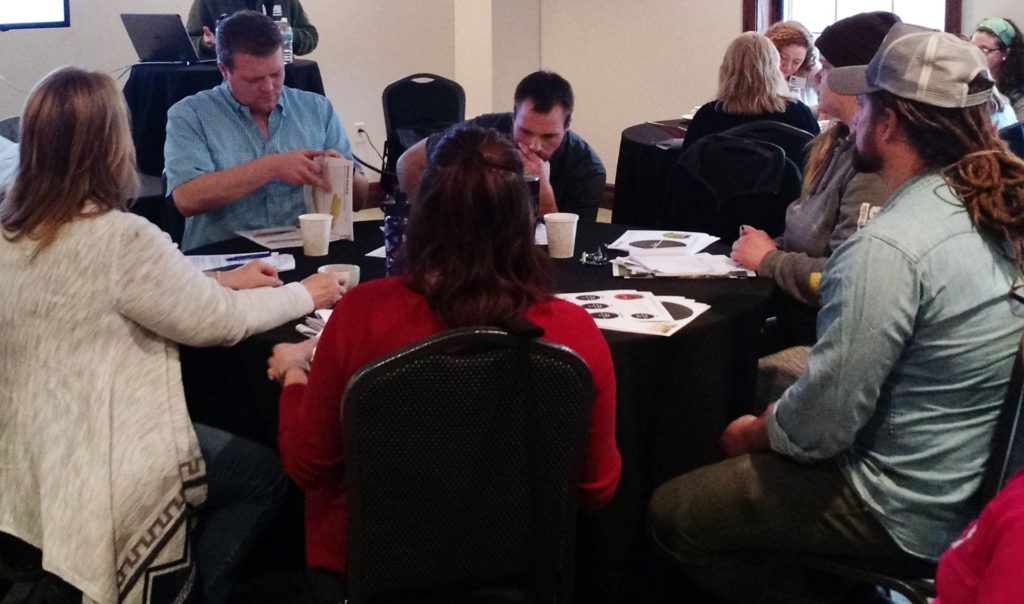Baskets to Pallets Training Aims for Holistic Approach
On March 14 and 15, the Baskets to Pallets project hosted a regional training in Rochester, NY. In this retrospect, Violet Stone shares how the training prioritized a holistic approach to learning about wholesale markets such as food hubs, groceries, schools and cooperatives.

Attendees practiced grading peppers, potatoes, tomatoes and cucumbers using the newly published Vegetable Grading Tools developed by the Cornell Vegetable Team. Courtesy of Jarmila Hasaler.
As project coordinator of the Baskets to Pallets project, much of the work I do is at a desk, coordinating the development of new resources or designing workshops. So, I’m always excited to be in a room resounding with conversation and energy as farmers and food producers meet and learn from one another. This was the happy scene at our Baskets to Pallets training on March 14 and 15 in Rochester, NY.
The Baskets to Pallets training debuted in the Catskills in 2017 and circled up to the Tug Hill Plateau in 2018. I’m passionate about creating a healthy, inviting space conducive to learning, so each time we offer this training I incorporate more comforts I consider essential for success. Our gathering in Rochester took place at the Irondequoit Conference Center, a light-filled room with access to fresh air. We enjoyed plenty of healthy snacks and meals sourced primarily through Headwater Food Hub. Even at the end of winter, we were still able to enjoy a seasonal menu with local meats, cheeses, seeds, mushrooms and fresh microgreens.
Beyond ensuring attendees are comfortable and well-fed, this training incorporates lots of time for discussion and activities. We avoid turning the lights low and flashing a long sequence of slides to lull you into nap-land. Our goal is to present short bursts of useful information and then offer space for you to consider, digest and reflect on how the information presented resonates or applies to your farm or food business.
We also respect the incredible wealth of knowledge and experience in the room. This training typically draws 50 farmers of all enterprises from a 100-mile radius. We had dairy and grain farmers sitting at the table with cut flower growers and urban market gardeners. Some had been farming for over 20 years and some were still writing business plans. Ensuring time in each lesson plan for exchange of ideas, successes and failures is an essential part of maintaining energy and engagement.
I always feel as though I’m leaving a new neighborhood at the conclusion of this training. We get to know each other and many go home with a few new friends or professional contacts. I always hope attendees feel that they have increased their knowledge and skills and developed new business goals, but more importantly, I hope they feel taken care of. It’s not easy for a farmer or food producer to leave the business for two days for a long-distance trip. Creating a holistic approach to learning by respecting a person’s intellectual, emotional, social and physical needs continues to be the highest priority for me as this training evolves.
Many thanks to the team of instructors and buyers for sharing their expertise and perspectives, and Cornell Cooperative Extension of Monroe County for co-hosting this training. To learn more about the training, visit https://smallfarms.cornell.edu/projects/wholesale/.
The Baskets to Pallets training will be offered in the Hudson Valley region in late 2019 or early 2020. To receive an announcement, please email Violet Stone at vws7@cornell.edu.

